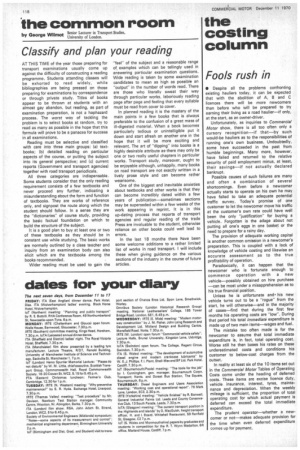the common room
Page 120

If you've noticed an error in this article please click here to report it so we can fix it.
by George Wilmot Senior Lecturer in Transport Studies,
University of London. University of London.
Classify and plan your reading
AT THIS TIME of the year those preparing for transport examinations usually come up against the difficulty of constructing a reading programme, Students attending classes will be exhorted to read widely, while bibliographies are being pressed on those preparing for examinations by correspondence or through private study. Titles of books appear to be thrown at students with an almost gay abandon, but reading, as part of examination preparation, is not a haphazard process. The worst way of tackling the problem is to select books at random, try to read as many as possible in the hope that this formula will prove to be a panacea for success in all examinations.
Reading must be selective and classified with care into three main groups: (a) textbooks; (b) detailed reading on particular aspects of the course, or putting the subject into its general perspective; and (c) current reports (Government and transport agencies) together with road transport periodicals.
All three categories are indispensable. Some students consider that the only reading requirement consists of a few textbooks and never proceed any further, indicating a misunderstanding about the form and function of textbooks. They are works of reference only, and signpost the route along which the student should follow. In a sense they are the "dictionaries" of course study, providing the basic factual foundation on which to build the structure of the subject.
It is a good plan to buy at least one or two of these textbooks as they should be in constant use while studying. The basic works are normally outlined by a class teacher and inquiry from an examination body can also elicit which are the textbooks among the books recommended.
Wider reading must be used to gain the "feel" of the subject and a reasonable range of examples which can be tellingly used in answering particular examination questions. Wide reading is taken by some examination candidates to mean as high as possible an "output" in the number of words read. There are those who literally sweat their way through particular works, laboriously reading page after page and feeling that every syllable must be read from cover to cover.
In planned reading it is the mastery of the main points in a few books that is always preferable to the confusion of a great mass of ill-digested material. When a book becomes particularly tedious or unintelligible put it down and start afresh on another one in the hope that it will be more exciting and relevant. The art of "dipping" into books is a highly desirable attribute as there may only be one or two really useful chapters in particular works. Transport study, moreover, ought to be enjoyable although, unhappily, many books on road transport are not exactly written in a lively prose style and can become rather wearisome.
One of the biggest and inevitable anxieties about textbooks and other works is that they can become incredibly dated within a few years of publication—sometimes sections may be superseded within a few weeks of the work appearing in reprint. It is in this up-dating process that reports of transport agencies and regular reading of the trade Press are invaluable to the student, otherwise reliance on other books could well lead to errors.
In the last 18 months there have been some welcome additions to a rather limited list of works in road transport. I will include these when giving guidance on the various sections of the industry in the course of future articles.






























































































































































